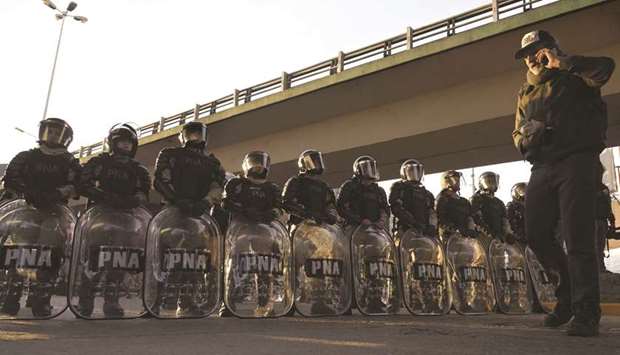A nationwide strike in Argentina protesting austerity measures under President Mauricio Macri brought the country’s airports to a standstill and halted work at key grains ports yesterday, the latest sign of tension in the recession-hit nation.
The strike, called by the country’s main unions, comes as centre-right leader Macri tumbles in the polls ahead of presidential elections in October, his popularity with voters hurt by high inflation, job losses and a weak peso.
With transport links down and many schools, offices and banks closed, streets in central Buenos Aires were eerily quiet in the morning ahead of expected demonstrations sparked by the powerful CGT umbrella union.
Closely tied to the Peronist political opposition, the CGT is demanding the government back salary increases that match high inflation — prices are up more than 50% over the last year — and that reduce the tax burden borne by workers.
In a video posted online, the union said it had gone on strike to force change in government policy as “the economic and social situation was getting worse day by day and inflation was destroying the purchasing power of people’s wages.”
The protests will also target rising service fees, the result of government efforts to cut the deficit under a financing deal with the International Monetary Fund.
High fees have exacerbated poverty levels.
The economic crisis has hurt Macri’s re-election chances badly, with the recently announced Peronist pairing of Alberto Fernandez and ex-President Cristina Fernandez de Kirchner ahead of the president in polls.
Yesterday, flights from Argentina’s airports were shut down as a result of the strike, while grain exports stopped at the ports in Rosario, one of the most important agro-industrial regions in the world.
The effects of the stoppage will also be felt in the soccer world.
The “Recopa” final, a South American cup-winners game due to be played between Argentina’s River Plate and Brazilian team Atlético Paranaense, was postponed until today because of the protest.
CGT chief Rodolfo Daer told local radio station Radio Mitre that the financial crisis would only get worse if the president failed to immediately reverse some of his policies.
Macri hopes that low inflation and a good soy harvest will alleviate the country’s economic woes in the coming months.

Members of the Argentine Naval Prefecture stand guard as activists of leftist parties and social organisations block the Pueyrredon bridge in Buenos Aires yesterday during a 24-hour general strike called by workers’ unions to demand the government of Argentine President Mauricio Macri to take measures against inflation and keep the campaign promises.
